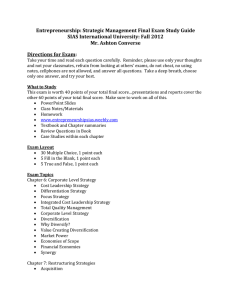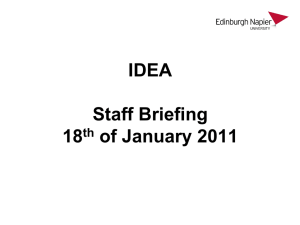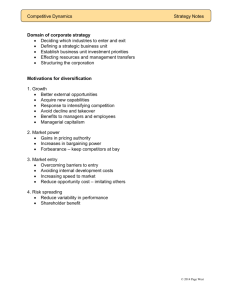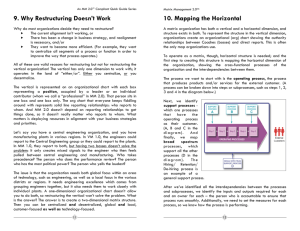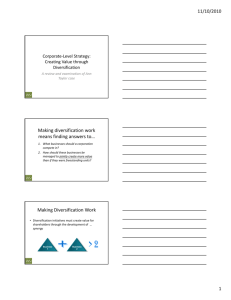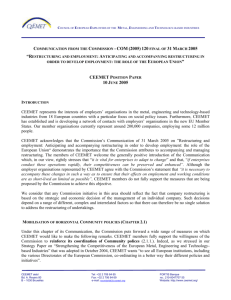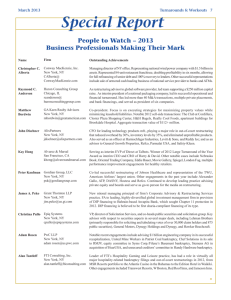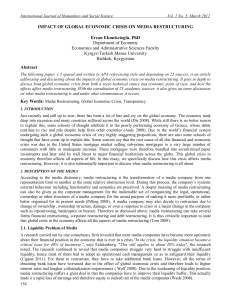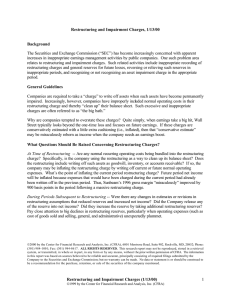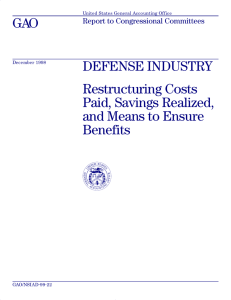We - Entrepreneurship and Strategic Management @ Sias
advertisement
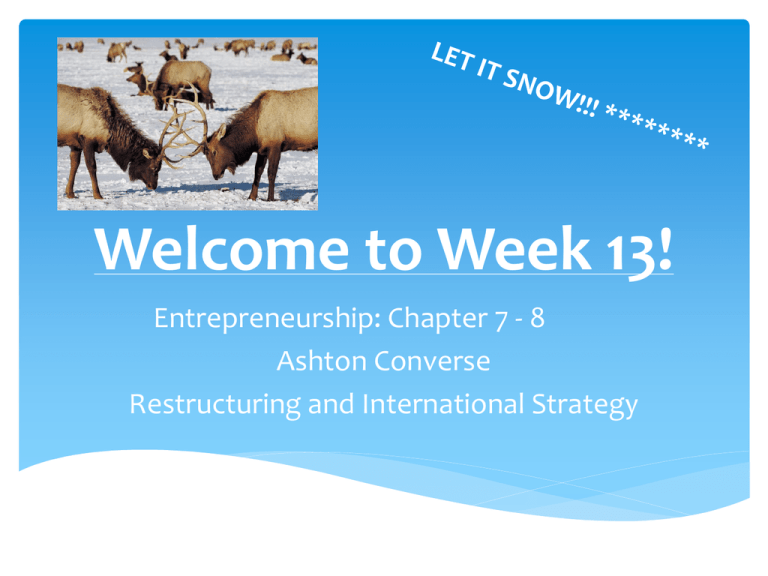
Welcome to Week 13! Entrepreneurship: Chapter 7 - 8 Ashton Converse Restructuring and International Strategy Objectives and Schedule Welcome – Share about weekend Great thanksgiving, orphanage, and more Review Collect Homework Finish Chapter 7 and Discovering Restructuring Start Chapter 8 and International Strategies Use understandings to complete team tasks and further our business plans Welcome Thanksgiving! Orphanage Trip! Watched Thor with Grace! The Ohio State Football Team is Undefeated Relaxed a little…but stayed busy Started to LISTEN TO CHRISTMAS MUSIC! Review What is Thanksgiving about? Why do most U.S. Americans celebrate Thanksgiving? What TV show did we watch last week? 2 weeks ago we talked about diversification, what is diversification? What is a merger? What is a takeover? What is an acquisition? Collect Homework Please pass your Business Plan homework for the Amazing Race show, forward. I will collect all of them. Did you enjoy the Amazing Race? Is this a good activity to do in class? Any improvements? Discover Restructuring Cost of New Product Development Developing new products successfully requires large investments within a firm’s resources Time Money Equipment Resources This makes it difficult to make a quick profit Meaning, new product development takes time to earn profit Restructuring and More Acquisition May Be the Better Answer Another way a firm can gain profit Gain access to new products without developing the production process Quick access to new product markets Possible path to enter international markets Lower risk and increased diversification Helps define the companies competitive scope Gives company new abilities and opportunities Problems in Successful Acquisition Integrating to companies together can create many conflicts Can create a broader target and ruin the companies successful focus May increase or create company debt Synergy may not be present (working together) Too much diversification…no direct goal Too large of company can open more costs More time and energy needed from managers Restructuring Strategy through which a firm changes its set of businesses or its financial structure Restructuring comes from many possible events Company Growth or Decrease in Size Opportunities for possible higher profits Need to survive and stay in business Changing products for success Bored or have too much money Desiring more power…and more Restructuring Continued Downsizing Now seen as a restructuring strategy instead of a business failure Downsizing is a decrease (reduction) in the number of firm’s employees and sometimes its operating units Downscoping Set of actions that causes a firm to refocus on its core businesses Maybe they will ignore or get rid of (eliminate) other businesses Restructuring Via Shareholders What is a shareholder? Someone who invested in the company They purchased stock Leveraged Buyouts Restructuring strategy that corrects managers mistakes or self-centered decisions Caused by not looking at shareholders interests Used to help expand the company Welcome to Chapter 8 Read “Shanghai Automotive Industry Corporation: Reaching for Global Markets” on page 174-175 When you have read through the article, discuss with 2 to 4 other people about what you read: Your Thoughts about the Article Maybe what you learned What you thought to be good Etc… Thinking Internationally International Strategy: Strategy through which the firm sells is goods or services outside its domestic market Discuss with 2 to 4 people the following topics: Why would companies want to sell internationally? Think of at least 3 advantages to selling internationally. Write them down. Think of at least 3 disadvantages to selling internationally. Write them down. Business Plan Application Take time now to work on your business plans and talk with your team Make sure to discuss the following areas: Contact information: address, cell #, QQ, email, and more Times when the team can meet outside of class Use a log sheet to document when you meet Letter to City of proposal plan Welcome to Day 2 of Week 13! Objectives/Schedule: Welcome Review International Strategy Skills and Concepts Business Plan Practice Application and Challenge Assignment Review What did we discuss yesterday? Downsizing Downscoping International Strategy Advantages and Disadvantages of international strategy Shareholders Leveraged Buyouts Develop New Products Business Plan Application Take time now to work on your business plans and talk with your team (15 minutes) Make sure to discuss the following areas: Contact information: address, cell #, QQ, email, and more Times when the team can meet outside of class Use a log sheet to document when you meet Letter to City of proposal plan International Strategy Continued Four Benefits of International Strategy 1. Increased Market Size How is a larger market size good for a company? 2. Return on Investment What type of investments do we mean? 3. Economies of Scale and Learning Global economies of scale allow for companies to do what? 4. Location Advantages How can a different location be an advantage? Choosing an International Strategy Companies get to decide to use one or both basic types of international strategies. Can you guess what they are? 1. International Business-Level Strategy The resources and capabilities established in the home country usually allow the company to use the strategy into markets outside their country. 2. International Corporate-Level Strategy Focus on the scope of a company’s operations through both product and geographic diversification Required when the company operates in multiple industries and multiple countries or regions Multidomestic, global, and transnational (3 types) International Corporate-Level Strategies Multidomestic Strategy: International strategy which decisions are centered to the strategic business in each country Helps them form the products to the local market Example: McDonalds, KFC, and more! Global Strategy: International strategy where firm offers standardized products across the different country markets. Transnational Strategy: International strategy which the firm seeks to achieve both global effeciency and local responsiveness Choices of International Entry Modes 1. Exporting 1. High cost, low control 2. Licensing 1. Low cost, low risk, little control, low returns 3. Strategic Alliances 1. Shared costs, shared resources, shared risks, problems of integration 4. Acquisition 1. Quick access to new market, high cost, complex negotiations, problems of merging with domestic operations 5. New Wholly Owned Subsidiary 1. Complex, often costly, time consuming, high risk, maximum control, potential above-average returns Converse about Concepts International Diversification Strategy which a firm expands its sales of its goods or services across the borders of global regions and countries into different geographic location or markets 1. Provides potential for firm to achieve greater returns on their innovations 2. Reduce some risks of investments 3. Provides desire to innovate 4. Boost performance and resources use Difficult, Limited, and Risky What are some Problems that managers may have when trying to manage multinational companies? 1. Become to complex 2. Too large to watch over 3. Cost becomes too high, higher than benefits 4. Too many cultures to keep up with 5. Competition is too fierce (difficult) 6. Instable currencies (always changing) 7. Change in laws and rules 8. Political Risks 9. Economic Risks Business Plan What Your Team Should Already Have Completed: Company Name Mission Statement Vision Statement Competitive Advantage Location Investors Contact Information Time to Meet Up…start keeping a log Presentation Work: Investors Plan a Presentation for The Investors and Community involved in your Company! Include the following: (make in PowerPoint…about 10 minutes total) Company Name and Introduction Importance of Company (Why?) What the Company Does (reason) How it will help the community/city Business Goals for the First 5 Years How you are different than other companies (competitive advantage) Who will fund you (the investors) What do the investors get in return?
